#something about how women are seen as more primitive and uncontrollable
Text
I’ve had lucille for 154 pages and GOD lucy if I could give you a new author I WOULD you deserve it and I’m so sorry
#if I could also knock some sense into jonathan (not THAT jonathan) for you I would in a heartbeat#but Lucy I’m so sorry your author wrote you like this#‘she was surprised those soldiers didn’t notice her because so many men noticed her because of her body it was a fact of life’#or however it was worded#and you’ve been attracted to both the men you’ve met upon meeting them without question#one of them being drac himself#Lucy I’m so sorry#woman written by a man moment#also the fact you as the only women are the one actively dabbling in like. rituals and spell casting?#something about how women are seen as more primitive and uncontrollable#and untamed and less rational#sorry lucy :(
18 notes
·
View notes
Link
“These twelve dubious concepts promote conflict, cruelty, suffering and death rather than love and peace.
1. Chosen People –The term “Chosen People” typically refers to the Hebrew Bible and the ugly idea that God has given certain tribes a Promised Land (even though it is already occupied by other people). But in reality many sects endorse some version of this concept. The New Testament identifies Christians as the chosen ones. Calvinists talk about “God’s elect,” believing that they themselves are the special few who were chosen before the beginning of time. Jehovah’s witnesses believe that 144,000 souls will get a special place in the afterlife. In many cultures certain privileged and powerful bloodlines were thought to be descended directly from gods (in contrast to everyone else).
Religious sects are inherently tribal and divisive because they compete by making mutually exclusive truth claims and by promising blessings or afterlife rewards that no competing sect can offer. “Gang symbols” like special haircuts, attire, hand signals and jargon differentiate insiders from outsiders and subtly (or not so subtly) convey to both that insiders are inherently superior.
2. Heretics – Heretics, kafir, or infidels (to use the medieval Catholic term) are not just outsiders, they are morally suspect and often seen as less than fully human. In the Torah, slaves taken from among outsiders don’t merit the same protections as Hebrew slaves. Those who don’t believe in a god are corrupt, doers of abominable deeds. “There is none [among them] who does good,” says the Psalmist. Islam teaches the concept of “dhimmitude” and provides special rules for the subjugation of religious minorities, with monotheists getting better treatment than polytheists. Christianity blurs together the concepts of unbeliever and evildoer. Ultimately, heretics are a threat that needs to be neutralized by conversion, conquest, isolation, domination, or—in worst cases—mass murder.
3. Holy War – If war can be holy, anything goes. The medieval Roman Catholic Church conducted a twenty year campaign of extermination against heretical Cathar Christians in the south of France, promising their land and possessions to real Christians who signed on as crusaders. Sunni and Shia Muslims have slaughtered each other for centuries. The Hebrew scriptures recount battle after battle in which their war God, Yahweh, helps them to not only defeat but also exterminate the shepherding cultures that occupy their “Promised Land.” As in later holy wars, like the modern rise of ISIS, divine sanction let them kill the elderly and children, burn orchards, and take virgin females as sexual slaves—all while retaining a sense of moral superiority.
4. Blasphemy – Blasphemy is the notion that some ideas are inviolable, off limits to criticism, satire, debate, or even question. By definition, criticism of these ideas is an outrage, and it is precisely this emotion–outrage–that the crime of blasphemy evokes in believers. The Bible prescribes death for blasphemers; the Quran does not, but death-to-blasphemers became part of Shariah during medieval times.The idea that blasphemy must be prevented or avenged has caused millions of murders over the centuries and countless other horrors. As I write, blogger Raif Badawi awaits round after round of flogging in Saudi Arabia—1000 lashes in batches of 50—while his wife and children plead from Canada for the international community to do something.
5. Glorified suffering – Picture secret societies of monks flogging their own backs. The image that comes to mind is probably from Dan Brown’s novel, The Da Vinci Code, but the idea isn’t one he made up. A core premise of Christianity is that righteous torture—if it’s just intense and prolonged enough–can somehow fix the damage done by evil, sinful behavior. Millions of crucifixes litter the world as testaments to this belief. Shia Muslims beat themselves with lashes and chains during Aashura, a form of sanctified suffering called Matam that commemorates the death of the martyr Hussein. Self-denial in the form of asceticism and fasting is a part of both Eastern and Western religions, not only because deprivation induces altered states but also because people believe suffering somehow brings us closer to divinity.
Our ancestors lived in a world in which pain came unbidden, and people had very little power to control it. An aspirin or heating pad would have been a miracle to the writers of the Bible, Quran, or Gita. Faced with uncontrollable suffering, the best advice religion could offer was to lean in or make meaning of it. The problem, of course is that glorifying suffering—turning it into a spiritual good—has made people more willing to inflict it on not only themselves and their enemies but also those who are helpless, including the ill or dying (as in the case of Mother Teresa and the American Bishops) and children (as in the child beating Patriarchy movement).
6. Genital mutilation – Primitive people have used scarification and other body modifications to define tribal membership for as long as history records. But genital mutilation allowed our ancestors several additional perks—if you want to call them that. In Judaism, infant circumcision serves as a sign of tribal membership, but circumcision also serves to test the commitment of adult converts. In one Bible story, a chieftain agrees to convert and submit his clan to the procedure as a show of commitment to a peace treaty. (While the men lie incapacitated, the whole town is then slain by the Israelites.)
In Islam, painful male circumcision serves as a rite of passage into manhood, initiation into a powerful club. By contrast, in some Muslim cultures cutting away or burning the female clitoris and labia ritually establishes the submission of women by reducing sexual arousal and agency. An estimated 2 million girls annually are subjected to the procedure, with consequences including hemorrhage, infection, painful urination and death.
7. Blood sacrifice – In the list of religion’s worst ideas, this is the only one that appears to be in its final stages. Only some Hindus (during the Festival of Gadhimai) and some Muslims (during Eid al Adha, Feast of the Sacrifice) continue to ritually slaughter sacrificial animals on a mass scale. Hindu scriptures including the Gita and Puranas forbid ritual killing, and most Hindus now eschew the practice based on the principle of ahimsa, but it persists as a residual of folk religion.
When our ancient ancestors slit the throats on humans and animals or cut out their hearts or sent the smoke of sacrifices heavenward, many believed that they were literally feeding supernatural beings. In time, in most religions, the rationale changed—the gods didn’t need feeding so much as they needed signs of devotion and penance. The residual child sacrifice in the Hebrew Bible (yes it is there) typically has this function. Christianity’s persistent focus on blood atonement—the notion of Jesus as the be-all-end-all lamb without blemish, the final “propitiation�� for human sin—is hopefully the last iteration of humanity’s long fascination with blood sacrifice.
8. Hell – Whether we are talking about Christianity, Islam or Buddhism, an afterlife filled with demons, monsters, and eternal torture was the worst suffering that Iron Age minds could conceive and medieval minds could elaborate. Invented, perhaps, as a means to satisfy the human desire for justice, the concept of Hell quickly devolved into a tool for coercing behavior and belief.
Most Buddhists see hell as a metaphor, a journey into the evil inside the self, but the descriptions of torturing monsters and levels of hell can be quite explicit. Likewise, many Muslims and Christians hasten to assure that it is a real place, full of fire and the anguish of non-believers. Some Christians have gone so far as to insist that the screams of the damned can be heard from the center of the Earth or that observing their anguish from afar will be one of the pleasures of paradise.
9. Karma – Like hell, the concept of karma offers a selfish incentive for good behavior—it’ll come back at you later—but it has enormous costs. Chief among these is a tremendous weight of cultural passivity in the face of harm and suffering. Secondarily, the idea of karma can sanctify the broad human practice of blaming the victim. If what goes around comes around, then the disabled child or cancer patient or untouchable poor (or the hungry rabbit or mangy dog) must have done something in this or a previous life to bring their position on themselves.
10. Eternal Life – To our weary and unwashed ancestors, the idea of gem encrusted walls, streets of gold, the fountain of youth, or an eternity of angelic chorus (or sex with virgins) may have seemed like sheer bliss. But it doesn’t take much analysis to realize how quickly eternal paradise would become hellish—an endless repetition of never changing groundhog days (because how could they change if they were perfect).
The real reason that the notion of eternal life is such a bad invention, though, is the degree to which it diminishes and degrades existence on this earthly plane. With eyes lifted heavenward, we can’t see the intricate beauty beneath our feet. Devout believers put their spiritual energy into preparing for a world to come rather than cherishing and stewarding the one wild and precious world we have been given.
11. Male Ownership of Female Fertility – The notion of women as brood mares or children as assets likely didn’t originate with religion, but the idea that women were created for this purpose, that if a woman should die of childbearing “she was made to do it,” most certainly did. Traditional religions variously assert that men have a god-ordained right to give women in marriage, take them in war, exclude them from heaven, and kill them if the origins of their offspring can’t be assured. Hence Catholicism’s maniacal obsession with the virginity of Mary and female martyrs. Hence Islam’s maniacal obsession with covering the female body. Hence Evangelical promise rings, and gender segregated sidewalks in Jerusalem and orthodox Jewish women wearing wigs over shaved heads in New York.
As we approach the limits of our planetary life support system and stare dystopia in the face, defining women as breeders and children as assets becomes even more costly. We now know that resource scarcity is a conflict trigger and that demand for water and arable land is growing even as both resources decline. And yet, a pope who claims to care about the desperate poor lectures them against contraception while Muslim leaders ban vasectomies in a drive to outbreed their enemies.
12. Bibliolatry (aka Book Worship) – Preliterate people handed down their best guesses about gods and goodness by way of oral tradition, and they made objects of stone and wood, idols, to channel their devotion. Their notions of what was good and what was Real and how to live in moral community with each other were free to evolve as culture and technology changed. But the advent of the written word changed that. As our Iron Age ancestors recorded and compiled their ideas into sacred texts, these texts allowed their understanding of gods and goodness to become static. The sacred texts of Judaism, Christianity and Islam forbid idol worship, but over time the texts themselves became idols, and many modern believers practice—essentially—book worship, also known as bibliolatry.
“Because the faith of Islam is perfect, it does not allow for any innovations to the religion,” says one young Muslim explaining his faith online. His statement betrays a naïve lack of information about the origins and evolution of his own dogmas. But more broadly, it sums up the challenge all religions face moving forward. Imagine if a physicist said, “Because our understanding of physics is perfect, it does not allow for any innovations to the field.” Adherents who think their faith is perfect, are not just naïve or ill informed. They are developmentally arrested, and in the case of the world’s major religions, they are anchored to the Iron Age, a time of violence, slavery, desperation and early death.
Ironically, the mindset that our sacred texts are perfect betrays the very quest that drove our ancestors to write those texts. Each of the men who wrote part of the Bible, Quran, or Gita took his received tradition, revised it, and offered his own best articulation of what is good and real. We can honor the quest of our spiritual ancestors, or we can honor their answers, but we cannot do both.
Religious apologists often try to deny, minimize, or explain away the sins of scripture and the evils of religious history. “It wasn’t really slavery.” “That’s just the Old Testament.” “He didn’t mean it that way.” “You have to understand how bad their enemies were.” “Those people who did harm in the name of God weren’t real [Christians/Jews/Muslims].” Such platitudes may offer comfort, but denying problems doesn’t solve them. Quite the opposite, in fact.
Change comes with introspection and insight, a willingness to acknowledge our faults and flaws while still embracing our strengths and potential for growth. In a world that is teeming with humanity, armed with pipe bombs and machine guns and nuclear weapons and drones, we don’t need defenders of religion’s status quo—we need real reformation, as radical as that of the 16th Century and much, much broader. It is only by acknowledging religion’s worst ideas that we have any hope of embracing the best.”
Valerie Tarico is a psychologist and writer in Seattle, Washington.
https://valerietarico.com/2015/01/20/religions-dirty-dozen-12-really-bad-religious-ideas-that-have-made-the-world-worse/
384 notes
·
View notes
Photo
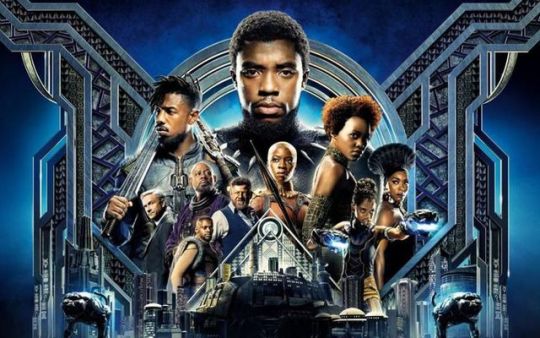
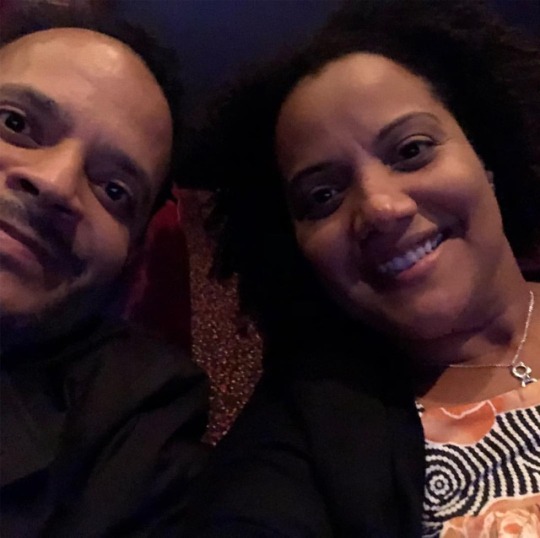
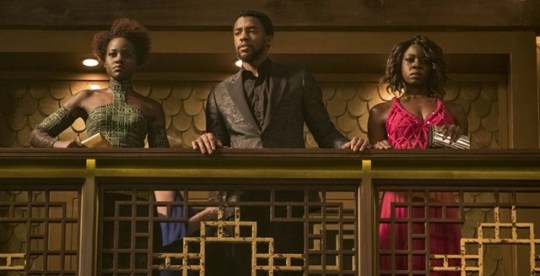
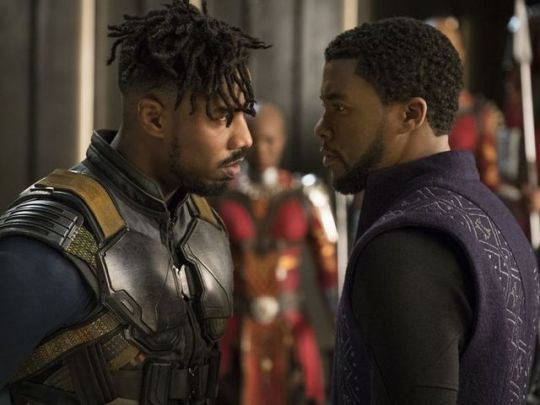
Finally getting around to watching Black Panther! Wow! So excited to wear my dress representing the women of Bangui Central African Republic. 🙅🏾♀️ (Who’s working on a closed fist Wakanda emoji?)
My Random Observations Regarding the Black Panther Film
#Wakandaforever
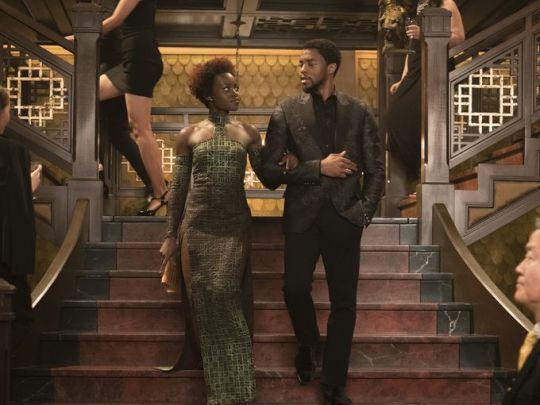
Marvel Studios/Disney via AP
I’m married to a Marvel enthusiast husband and am raising and educating a son who’s obsessed with all things Marvel and literally reads a Marvel encyclopedia. As his mother, I try to educate myself on the things that interest and inspire him. My husband took the two oldest kids to see Black Panther on opening day and I knew that it was driving them crazy not be able to discuss the film with me. On Monday afternoon, my husband came home early and insisted that we go watch the film. I felt like adventurous rebels by dropping everything and going on an adult date on a Monday night. I had already gone through my closet and dug out my Bangui dress that my sister had custom made for me years ago in the Central African Republic. Having watched every single Marvel film with my husband and son, I thought I was ready for what was to come as we entered into the #wakanda experience and boy was I in for an intellectual treat.
This waterfall scene took my breath away. All of it, the costumes, the music, the dancing, the reverence, the culture was a moment that captured the beauty of a fill done correctly.
Black Panther was filled with one liners that got my mind going and my heart moving. Shuri [to T’challa] Just because something works, doesn’t mean it can’t be improved. Let me start with this line because Shuri was my favorite character in the film. There’s so much to love about a 16 year old African girl, who’s brilliant, poised, brave and ready to do just about anything for her kingdom. What? The world needs more Shuris.
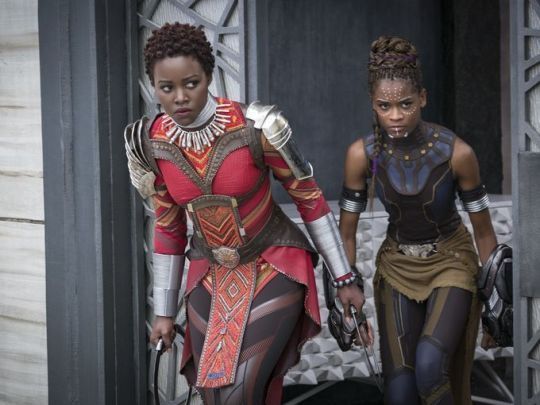
Marvel Studios/Disney via AP
If you want to find out why Shuri says the following line, make sure to do what all Marvel fans do and stay until the end of the second credits.
[after Everett Ross is wheeled in Wakandan facilities to be healed]
Shuri: Yay, another white boy to fix.
Travel is my escape. I have found myself longing more and more for adventure and trips to places where I don’t know the people, culture or food. I’m itching for adventure in ways that I have not before. The following lines left me pondering and analyzing my need to learn and experience life outside of the perceived comforts of The United States. My kids and I have spent our time discussing and sharing our feelings, thoughts and experiences as they related to these dialogues.
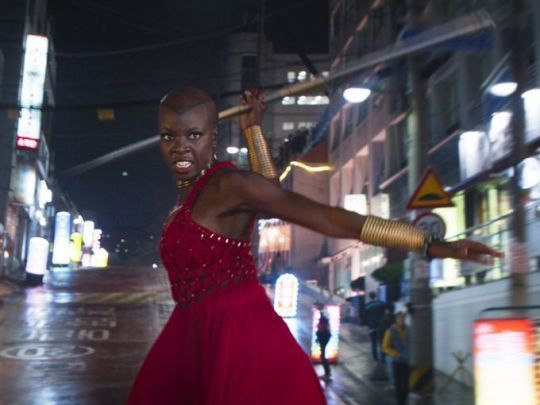
Marvel Studios/Disney via AP.
Okoye: Guns… so primitive!
T'Challa: Wakanda will no longer watch from the shadows. We can not. We must not. We will work to be an example of how we, as brothers and sisters on this earth, should treat each other. Now, more than ever, the illusions of division threaten our very existence. We all know the truth: more connects us than separates us. But in times of crisis the wise build bridges, while the foolish build barriers. We must find a way to look after one another, as if we were one single tribe.
Given the current climate in our country, I could spend hours thinking about the implication of these two scenes to my life in CT and also how my children will be raised and ultimately what their legacy will be.
I knew going into the film that I would connect with the women, but what surprised me the most was my understanding of and empathy toward Killmonger. His character was a perfect representation of what happens when we let rage be the prime motivator in our lives. His anger was justified, but his focus and actions were destructive not only to self, but also to those around him. His character was also the one that portrayed uncontrolled rage and violence.
Erik Killmonger: Y’all sitting up here comfortable. Must feel good. Meanwhile, there are about 2 billion people all over the world that looks like us. But their lives are a lot harder. Wakanda has the tools to liberate them all.
The final scene in this film left me breathless and analyzing the consequences of colonization, slavery and Jim Crow laws on African Americans. My heart literally hurt as I heard this line:
Killmonger: Nah, bury me in the ocean with my ancestors that jumped from the ships. Because they knew death was better than bondage.
My 12 year old daughter’s reflections on her Wakanda experience
It was the best Marvel movie that I’ve ever seen. I loved that there were funny parts, but also many deep and thought provoking ones.
My favorite line:
Okoye: Don’t freeze!
T'Challa: I never freeze.
Shuri: Did he freeze?
Okoye: Like an antelope in headlights.
My favorite character was Shuri because she was funny, smart, brave and strong. I loved her interactions with her brother (Black Panther), as I think it reflects my relationship with my brother. They were protective of each other and their skills complimented one another for the best interest of Wakanda. I left the movie feeling inspired.
My 9 year old’s son’s reflections on his Wakanda experience
My favorite character was M’Baku because he’s funny. My favorite lines are:
M'Baku: If you say one more word, I’ll feed you to my children!
[Ross shuts up, beat]
M'Baku: I’m kidding. We’re vegetarians.
I also saw myself in Erik Killmonger, as he was black boy growing up in America. He loved basketball, fighting (sparring) and his father.
Did you know that you can experience Black Panther at Disney California Adventure Park?
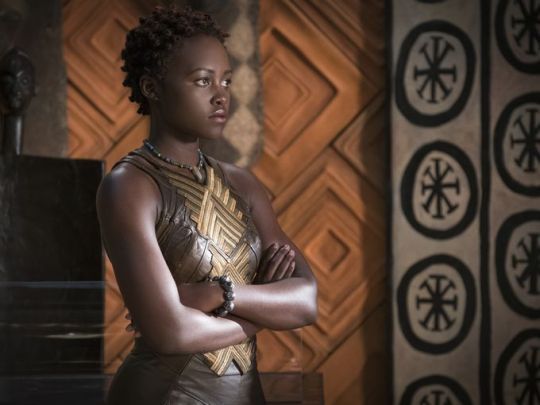
Marvel Studios/Disney via AP
Educational Resources for Black Panther
- Check out the history of Black Panther in Marvel Comic Books.
- Video: Ron Clark Academy Travels to Wakanda
- Disney’s Black Panther Activity Packet.
- This is a wonderful resource for High School or College students who are ready to analyze and better understand Killmonger’s rage.
- Teacher resources for maximizing the Black Panther momentum and merging it into lesson plans.
- Christians who are trying to figure out why they should watch this film, should read this. This is a direct quote from the write-up. “At the end of the film – it’s actually in a post-credits scene – T’Challa says his country must start building bridges instead of barriers. It’s not exactly a subtle moment, politically speaking, but considering what’s come prior it’s an earned one. Black Panther is a radical film in that it looks at our country racially, culturally, politically, dares to find empathy in both sides, but ultimately insists you can’t ever truly be great if you’re not first good.It’s a point Christians would do well to consider.”
- Check out this Teachers Pay Teachers Unit Study about the movie.
- Why Black Panther is more than a movie, it’s a revolution.
- A White Guy’s Reflections on Black Panther.
Author: Ruth Mendes of Have Kiddos will Travel
About Ruth: I am a wife, mami of 4 active and globe-trotting kiddos. I’ve always loved a good adventure and truly believe that it’s possible to travel with kids. Join me, as I share our adventures and inspire you to get out of the house with your kiddos. Whether you’re planning a family vacation, a road trip or a trip of a lifetime to an exotic destination, I’ll share insights, trip reports and information that will inspire you. Check back often to stay up to date on things to do with kids at your next travel destination.
#havekiddoswilltravel#blackpanther#warriorprincess#datenight#marvel#wakandaforever#kidsmoviereviews#disney#orlando#fl#ca#adventure#adventurepark#teachingkids#homeschoolresources#intentionalpareting#christianliving#marriage#family#life#homeschool resources#homeschool#lessonresources#bloggervibes
1 note
·
View note